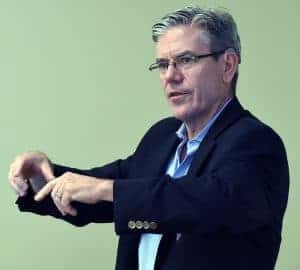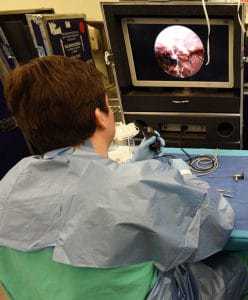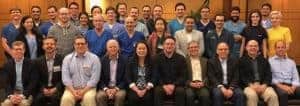Twenty-four otology fellows from 10 countries recently learned advanced techniques in otologic surgery from international experts at an annual fellows course hosted by the UAMS Department of Otolaryngology – Head & Neck Surgery.
The Otology Fellows Congress and Advanced Course in Ear & Skull Base Surgery was held April 27-29 in the Yasargil Surgical Skills Laboratory & Education Center in the Jackson T. Stephens Spine & Neurosciences Institute at UAMS. It was the third year for the conference, and all invited fellows participate in the course free of charge.
John Dornhoffer, M.D., department chairman and one of four collaborating directors for the course, said there are several things that make it unique: the expert panel of educators, the advanced surgical techniques being offered, the specialized facilities, and, of course, the price.
“This course really brings together people who are going to change the future for patients all over the world,” Dornhoffer said. “The hope is to train them, but also to establish networking opportunities and collaborations so we can truly make the treatment of ear conditions and the advancement of the science an international effort.”
The course was made up of lectures, labs and lab dissections taught by 10 faculty who are international leaders in their respective areas of expertise, such as chronic ear conditions, cochlear implantation, auditory hair cell regeneration, congenital aural atresia and more.
Course participation is limited to otology fellows, who have already dedicated many years of study to training in the field. This specialization means the instructors are able to cover specific techniques and advanced surgeries that go beyond what is offered in other courses.
The topics included soft tissue flaps, implantable hearing devices like cochlear implants, workup for complex patients, endoscopic ear surgery and complex tympanoplasty and ossiculoplasty scenarios.
Course co-director Michael B. Gluth, M.D., director of the Comprehensive Ear & Hearing Center and director of the Bloom Otopathology Lab at the University of Chicago, credited the lab facilities at UAMS as a key part of the experience.

The Yasargil Center includes 12 stations for ear surgery, 12 stations for skull-base surgery and an anatomy lab, where the endoscopic training took place. The institute building was paid for by a donation from the late Jack Stephens of Little Rock, and Dornhoffer was able to participate in the design of the lab space.
“The physical lab facility is one of a kind,” Gluth said. “There’s really not another lab or facility that could even handle this. It’s almost unheard of.”
While a similar course might cost $3,000-$4,000, this course is free because of more than $100,000 in donations from industry sources. Lodging and dissection specimens are included. Participants only pay travel costs.
“Some of our participants are from countries where a training like this would otherwise be unaffordable,” Dornhoffer said. “It can feel like the United Nations of ear surgeries here, and we like that, because the bottom line is that they’re going to go back to their countries and they’re going to be able to do a better job on their patients.”
This year’s course included participants from Russia, Ukraine, China, Brazil, Italy, Australia, the United Kingdom, Canada, Germany and the United States.
For some, like Meiqun Wang from Nanchang, China, it was their first chance to take such a high-level course.
“I’m very interested in this training because in my country I rarely have the chance to take courses like this,” she said, adding that her biggest takeaway was the actual surgical techniques.
For others, like Jameson Mattingly from Ohio State University and Nedim Durakovic from Washington University in St. Louis, who have had previous exposure to many of the surgeries, the value came from listening to experts who have performed the surgeries hundreds of times and can offer advice that comes from experience.

“The faculty that are here are truly the experts in the field,” Mattingly said. “To have one-on-one time with them has been unique. The biggest takeaway has been listening to some of their specific cases, those pearls of experience.”
“And a lot of the surgeries are unique and are only done by a handful of people in the whole country,” Durakovic said. “It’s also been great just to socialize with the faculty and other fellows. These are people we will likely be around for the rest of our careers. It’s interesting to see how they do things differently, the nuances of patient care wherever they work.”
Sponsorship was provided by Stryker NSE, Advanced Bionics, Cochlear Americas, Grace Medical, MED-EL Corp. and Karl Storz Endoscopy-America.
“The industries see value in this because they know these participants are going to be the leaders of tomorrow in this field,” Dornhoffer said.
Dornhoffer is an international expert in chronic ear conditions. He and Gluth co-authored the textbook “The Chronic Ear,” which was given to the participants as part of the course. Dornhoffer’s main goal is to restore hearing to as many people as possible, and his work has included the development of new procedures and techniques for hearing reconstruction that are used worldwide. He has also designed several prostheses to replace bones in the middle ear.
Other instructors for the course included:
- Craig A. Buchman, M.D., otolaryngology department chairman at Washington University School of Medicine and international expert in cochlear implantation. Buchman is involved in the leadership of many of the discipline’s professional organizations.
- Lawrence R. Lustig, M.D., otolaryngology department chairman at Columbia University Vagelos College of Physicians and Surgeons in New York. His research has pioneered cochlear gene therapy for genetic forms of hearing loss. He is an expert in auditory hair cell regeneration.
- Alexander Huber, M.D., otolaryngology department chairman at the University Hospital Zurich. He is an internationally recognized pioneer in otology and skull-base surgery.
- Bradley W. Kesser, M.D., professor of otology and neurotology at the University of Virginia. He is the world’s expert in congenital atresia.
- Gluth, associate professor of surgery and director of the Comprehensive Ear & Hearing Center and director of the Bloom Otopathology Lab at the University of Chicago, with an expertise in the middle ear and reconstruction.
- Brandon Isaacson, M.D., course co-director for the program and associate professor of otology and neurotology and co-director of the University of Texas Southwestern Comprehensive Skull Base Program. He has expertise in endoscopic ear surgery.
- J. Walter Kutz Jr., M.D., course co-director for the program and associate professor of otology and neurotology at the University of Texas Southwestern Medical Center, with an expertise in acoustic neuroma outcomes.
- Samuel Gubbels, M.D., associate professor of otolaryngology at the University of Colorado School of Medicine and director of UCHealth Hearing and Balance clinics. He has expertise in stem cells and regenerative therapies for hearing loss.
- Betty S. Tsai Do, M.D., assistant professor of otology and neurotology at the University of Oklahoma Health Sciences Center, with an expertise in improving coordinated multidisciplinary care for otolaryngology patients and physician wellness.


